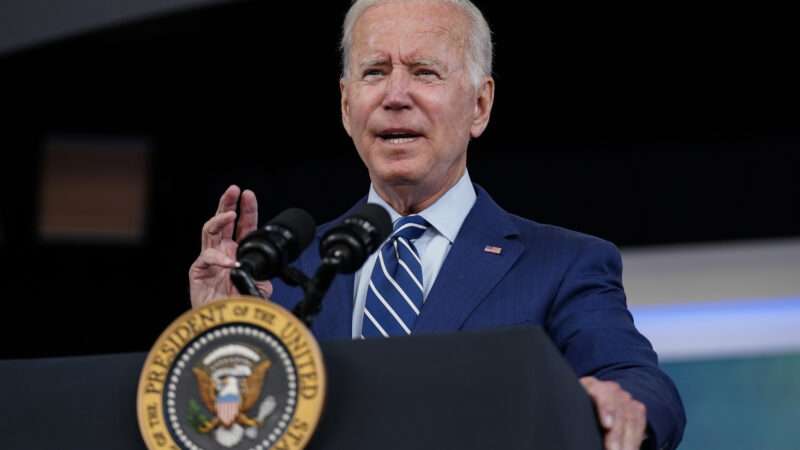
One of the most persistent, annoying, and dangerous lies regularly told in Washington, D.C., is that everything is paid for in full.
Let’s be clear: The federal government hasn’t fully paid for its normal, run-of-the-mill spending in a single year since 2001. If you believe the projections of the Congressional Budget Office (CBO), there is not a single year in the next 30 (the longest length of time for which the office projects spending and revenue) in which the budget will balance. Despite that, lawmakers from both parties continue to peddle this line whenever they want to make big policy changes. Democrats promised that Obamacare would be revenue-neutral. It hasn’t been. Republicans promised the Trump tax cuts would pay for themselves. They didn’t.
Now it’s the Democrats’ turn to play this game, and President Joe Biden has dutifully stepped up to the plate. Speaking Friday about the combination infrastructure package and budget reconciliation bills that the House may vote on sometime this week, the president declared that anyone worried about the latter legislation’s $3.5 trillion price tag should calm down.
“We talk about price tags. It is zero price tag on the debt,” Biden said. “We are going to pay for everything we spend.”
Sure, Joe.
Democrats are proposing to pay for their $3.5 trillion reconciliation package with about $2.3 trillion of tax increases and $700 billion in savings from changing how Medicare and Medicaid purchase pharmaceutical drugs. The rest is written off as being paid for with future economic growth—the idea being that increases in government spending will cause more hiring and greater economic activity, which will cause future tax collections to be higher than projected.
It’s a little bit like saying that your drinking habit can pay for itself, as Reason‘s Peter Suderman has explained.
The math doesn’t add up. In order to achieve the amount of “dynamic scoring” necessary to offset that last $600 billion or so of new spending, the reconciliation bill would have to boost America’s economic output by about 3.5 percent by 2021. That’s far in excess of what every independent assessment of the package says it will do. In fact, at least one assessment of the package says the bill’s tax increases and borrowing will more than cancel out the benefits of heightened spending, dragging growth lower.
The debate over those projections is pretty esoteric. But regardless of which forecast you believe, there’s no getting around the fact that some of the lawmakers now championing the magic of “dynamic scoring” used to be quite skeptical of it. Democrats on the House Ways and Means Committee—the very committee that put together the details of the reconciliation bill over the past few weeks—blasted Republicans for relying on “dynamic scoring” to make it look like the Trump tax cuts would balance over the long-term. In the Senate, meanwhile, Budget Committee Chairman Bernie Sanders (I–Vt.) used to call dynamic scoring a “gimmick” meant to “conceal” the real cost of legislation. Now, he’s fine with using it because Republicans did it first.
If hypocrisy could be taxed, maybe we’d be able to balance the budget.
That isn’t the only dubious assumption behind Biden’s promise that everything will be fully paid for. It doesn’t fully account for the long-term budget impact of the newly expanded child tax credit, which allows Congress to claim $700 billion in “savings” that are unlikely to materialize. The reconciliation bill also calls for boosting IRS enforcement in the hopes of generating $239 billion in revenue from taxes that are currently going uncollected. That is likely an overestimation, as the CBO says the provisions would generate no more than $120 billion from increased tax compliance.
If any of the overly rosy assumptions underpinning the reconciliation bill don’t come true, the excess cost will be added to the national debt. That means it will be added to the $1.9 trillion in one-time spending that Congress approved by Biden’s behest earlier this year—none of which was offset by spending reductions or paid for with tax increases. The national debt already matches the size of the nation’s economy and is on pace to keep growing for the foreseeable future even without adding to it.
If the bill is truly paid for, Democrats in Congress should prove as much by asking the CBO and the Joint Committee on Taxation to provide a detailed analysis of the “dynamic scoring” promises contained in the reconciliation bill. Without that, argues Chris Edwards, director of tax policy studies at the libertarian Cato Institute, Democrats’ claims that higher spending will generate sufficient economic growth have no hard backup.
“There is no magic money tree in Washington,” Edwards says. “Rather, taxpayers will ultimately pay for the spending through current tax increases, debt and future tax increases, and inflation.”
Some lawmakers, notably Sens. Joe Manchin (D–W.Va.) and Kyrsten Sinema (D–Ariz.), have refused so far to back the president’s plan due to their concerns about adding to the national debt. They should not be convinced by Biden’s phony promise of a “zero price tag”—even after the White House doubled down on that claim on Monday.
And taxpayers should not be comforted by another round of Washington’s favorite lie.
from Latest – Reason.com https://ift.tt/3CLD9iq
via IFTTT


